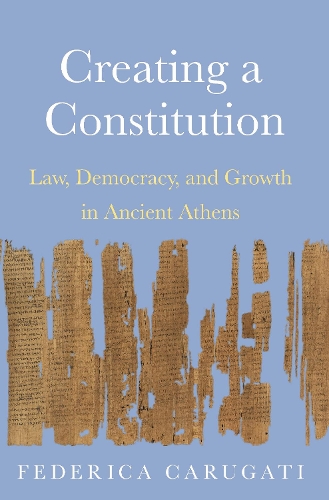
Creating a Constitution: Law, Democracy, and Growth in Ancient Athens
(Hardback)
Publishing Details
Creating a Constitution: Law, Democracy, and Growth in Ancient Athens
By (Author) Federica Carugati
Princeton University Press
Princeton University Press
29th October 2019
United States
Classifications
Tertiary Education
Non Fiction
Political science and theory
Constitution: government and the state
Constitutional and administrative law: general
Political economy
320.938
Physical Properties
Hardback
248
Width 156mm, Height 235mm
Description
A comprehensive account of how the Athenian constitution was created-with lessons for contemporary constitution-building We live in an era of constitution-making. More than half of the world's constitutions have been drafted in the past half-century. Yet, one question still eludes theorists and practitioners alike: how do stable, growth-enhancing constitutional structures emerge and endure In Creating a Constitution, Federica Carugati argues that ancient Athens offers a unique laboratory for exploring this question. Because the city-state was reasonably well-documented, smaller than most modern nations, and simpler in its institutional makeup, the case of Athens reveals key factors of successful constitution-making that are hard to flesh out in more complex settings. Carugati demonstrates that the institutional changes Athens undertook in the late fifth century BCE, after a period of war and internal strife, amounted to a de facto constitution. The constitution restored stability and allowed the democracy to flourish anew. The analysis of Athens's case reveals the importance of three factors for creating a successful constitution: first, a consensus on a set of shared values capable of commanding long-term support; second, a self-enforcing institutional structure that reflects those values; and, third, regulatory mechanisms for policymaking that enable tradeoffs of inclusion to foster growth without jeopardizing stability. Uniquely combining institutional analysis, political economy, and history, Creating a Constitution is a compelling account of how political and economic goals that we normally associate with Western developed countries were once achieved through different institutional arrangements.
Reviews
"This book does an excellent job of demonstrating the salience of Athens for our understanding of constitutionalism, and provides a historically well-grounded and analytically precise account of constitutional emergence."Melissa Schwartzberg, New York University
"Explaining Athenian institutions in a wonderfully clear and concise fashion, this book demonstrates how much insight can be gleaned from applying concepts and tools from the social sciences to classics research."F. Andrew Hanssen, Clemson University
Author Bio
Federica Carugati is a program director at the Center for Advanced Study in the Behavioral Sciences at Stanford University.
